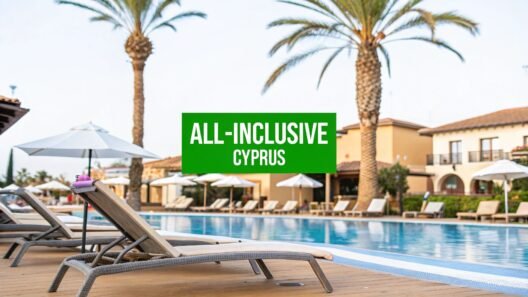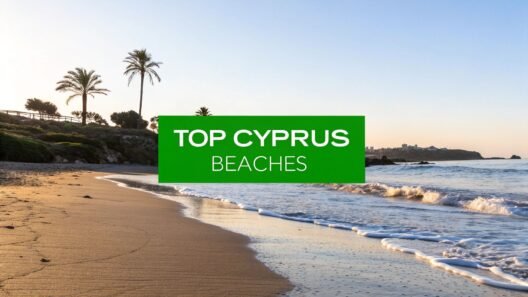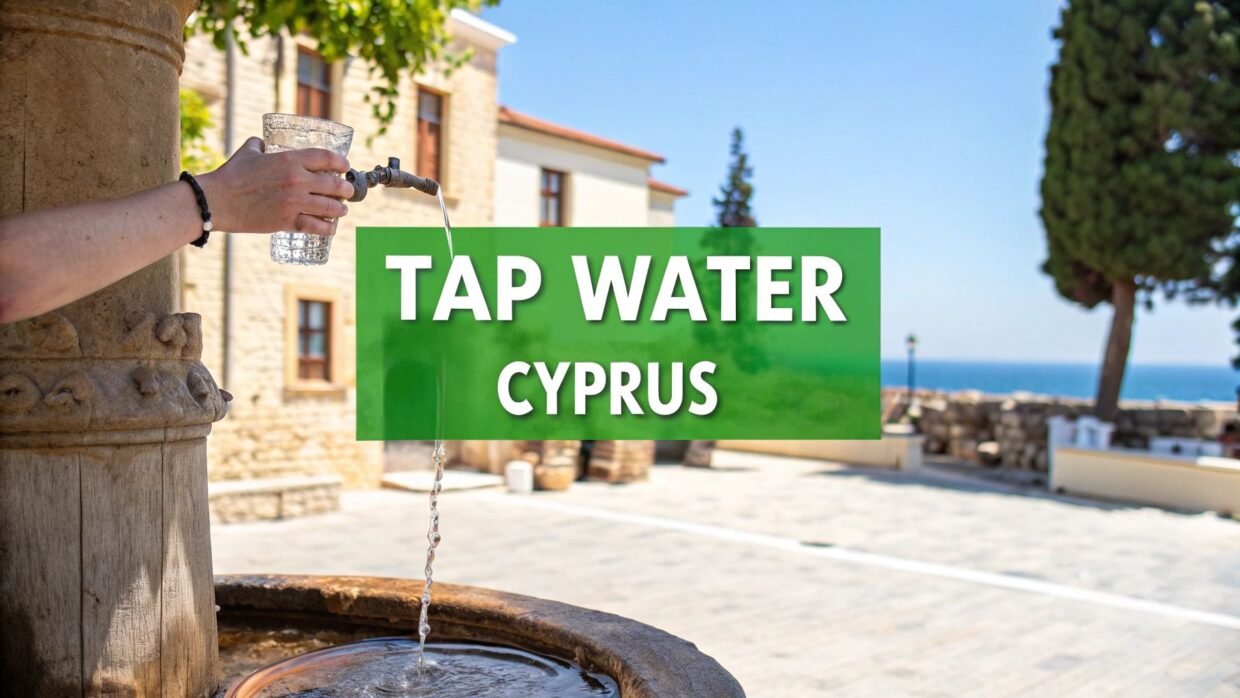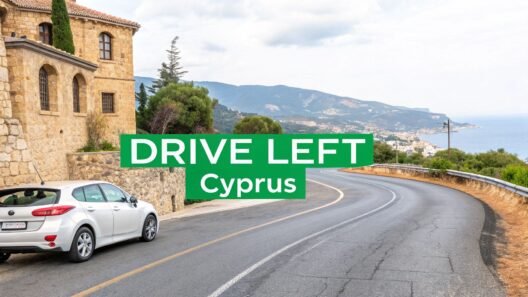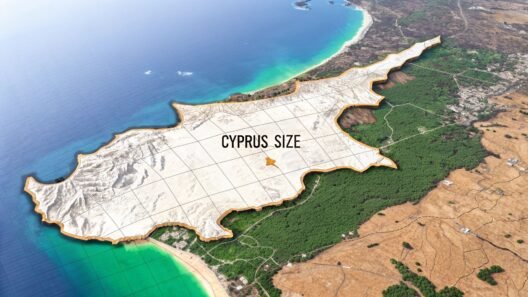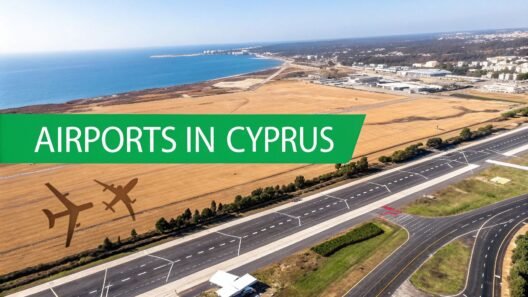So, can you actually drink the tap water in Cyprus? The official, straightforward answer is yes. The water is safe to drink and meets strict EU standards. But as with most things when you're travelling, the real story has a bit more flavour to it.
The Real Story on Drinking Cyprus's Tap Water
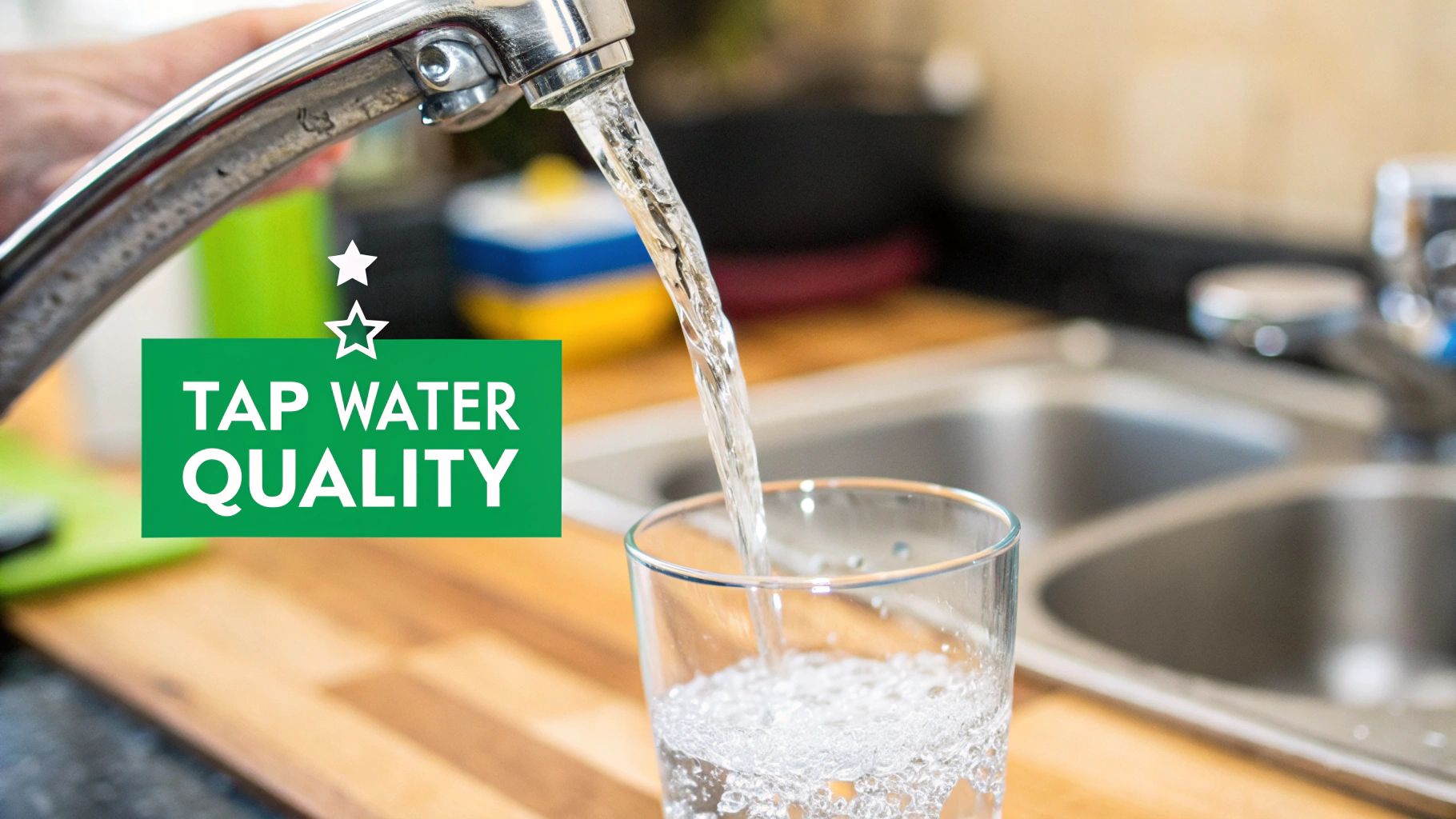
While the water coming out of the taps is technically pure and perfectly fine to consume, many visitors—and even plenty of locals—will tell you it has a distinct taste. This isn't a red flag for contamination. It's simply a result of how this sun-drenched island manages its water supply.
To give you a quick overview, here's a little table summarising what you need to know.
Cyprus Tap Water At a Glance
| Factor | Status | Key Consideration for Travellers |
|---|---|---|
| Official Safety | Safe | Meets stringent EU drinking water directives. |
| Common Taste | High in minerals | Noticeably different from UK tap water due to desalination; often described as "hard." |
| Infrastructure | Modern in cities | Urban and tourist areas have newer pipes; rural areas may have older systems. |
| Local Habits | Mixed | Many locals and expats prefer bottled or filtered water purely based on taste preference. |
Essentially, the water is safe, but the taste might take some getting used to.
Understanding the Taste and Quality
Cyprus has to get creative to keep the water flowing. A huge chunk of its drinking water comes from desalination plants, which do the incredible job of turning seawater into fresh water. This process is brilliant at removing nasties, but it tends to leave a higher concentration of minerals behind.
Think about the difference between bottled mineral waters. Some taste soft and neutral, while others have a much more pronounced, almost "heavy" taste. That’s pretty much what you’ll find with Cypriot tap water. The minerals are completely harmless, but they create a flavour that can be a bit of a surprise if you're accustomed to the softer water we get in most of the UK.
Regional Differences and Infrastructure
Because Cyprus is in the EU, its tap water has to meet the same high safety benchmarks across the board. That said, the taste and even the feel of the water can change depending on where you are. Big urban centres and tourist hotspots like Paphos or Limassol generally have modern, well-kept infrastructure, so the quality is very consistent.
In contrast, some of the more remote villages or older parts of town might have ageing pipework. This can sometimes affect the water's taste or even its clarity. It doesn’t automatically make it unsafe, but it’s one of the reasons local habits and opinions vary so much. If you're curious about the specifics, you can find more details on Cyprus's water supply and safety compliance.
This variation is why you'll see some people drinking straight from the tap without a second thought, while their neighbours swear by filter jugs or bottled water. It really just boils down to personal taste and what you're used to, not a question of safety.
Where Cyprus Gets Its Water
To get a real sense of the water flowing from your tap in Cyprus, it helps to understand its journey. Given the island's sun-soaked climate, natural freshwater is a precious commodity. This has pushed Cyprus to become a world leader in making its own supply through some clever technology. The story for most of the island's drinking water actually starts in the Mediterranean Sea.
This is where desalination takes centre stage. You can think of it as a huge, high-tech filtering process. Massive plants along the coast pull in seawater and force it through exceptionally fine membranes—a method known as reverse osmosis. It’s a powerful technique that strips out the salt, minerals, and other bits, leaving just pure H₂O behind.
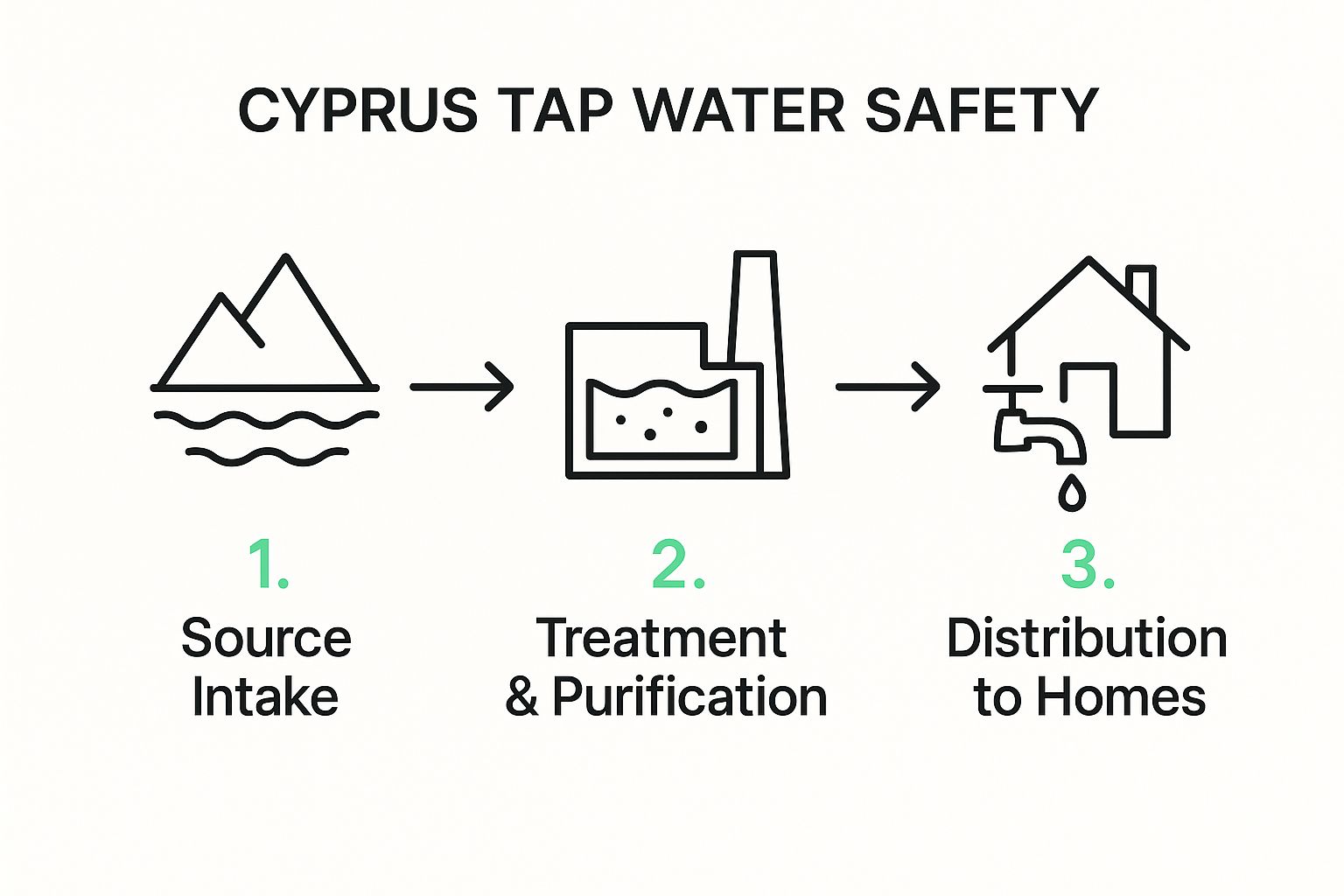
After this initial process, the water goes through several more treatment stages to ensure it's completely safe before it's pumped through the public network to your hotel or apartment. This heavy reliance on desalination is the primary reason you might notice a distinct taste in Cypriot tap water compared to what you're used to back home.
Other Water Sources
While desalination is the workhorse, it’s not the only player in the game. Cyprus also uses a system of reservoirs and boreholes, which are especially important for farming but also top up the drinking supply.
These other sources include:
- Mountain Reservoirs: In the cooler, wetter winter months, dams high up in the Troodos Mountains do the vital job of collecting rainfall. This water is absolutely crucial for refilling the island's reserves for the year ahead.
- Groundwater Boreholes: Deep wells, known as boreholes, tap into natural underground water sources called aquifers. This is a carefully controlled process to make sure these underground pockets aren't drained too quickly.
The water from all these different sources is often blended together before it ever reaches your tap. This helps create a more reliable and consistent supply, though the exact mineral mix can still change a little depending on where you are on the island and the season.
So, the water you end up drinking is a carefully managed cocktail. It’s a blend that leans heavily on modern tech to transform the sea into safe, clean water, ensuring a steady supply despite the island's naturally dry climate and giving the water its characteristic mineral-rich flavour.
How EU Standards Guarantee Water Safety
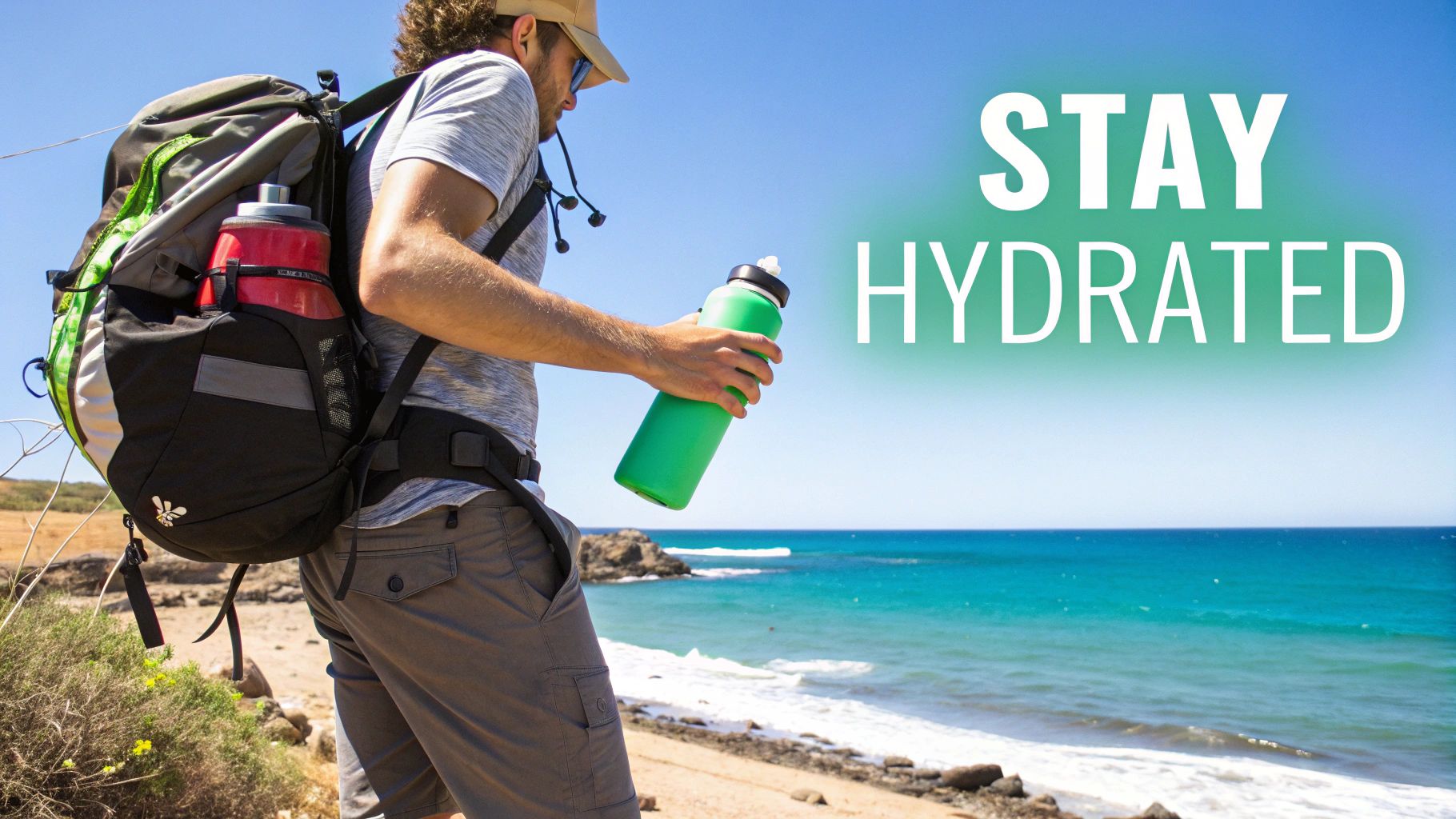
It’s one thing for someone to say the water is safe, but it’s another to know exactly why you can trust it. When you turn on a tap in Cyprus, you're not just relying on a local promise. The quality is backed by a powerful, continent-wide legal framework that protects millions of people every single day.
This is all thanks to the EU’s Drinking Water Directive. This isn't just a friendly suggestion; it's a set of legally binding rules for every member state. Since Cyprus is a full member of the European Union, it must follow these strict standards to the letter. You can learn more about its status in our guide explaining Cyprus’s membership in the EU.
Think of this directive as a comprehensive safety net. It sets firm limits on a huge range of potential contaminants, ensuring the water flowing from your tap is both wholesome and clean.
What Does The EU Directive Test For?
The directive demands regular, thorough testing for dozens of different substances to protect public health. It’s like a meticulous quality control checklist that water suppliers have no choice but to pass.
The key things they look for include:
- Microbiological Contaminants: This means checking for nasty bacteria like E. coli and Enterococci that can cause serious illness. The limits for these are incredibly strict.
- Chemical Substances: Regulators monitor everything from nitrates and pesticides used in farming to heavy metals like lead and copper, which can leach from old pipes.
- Indicator Parameters: They also keep an eye on factors like colour, taste, and turbidity (cloudiness). While not always dangerous, these can be early warning signs of a problem in the system.
This systematic approach means the water isn't just safe from invisible threats, but it also looks and tastes perfectly fine.
For anyone visiting from the UK, this whole system will probably sound very familiar. The high standards enforced in Cyprus are the very same ones you trust back home.
In fact, water quality across the EU is consistently excellent. The UK, for instance, has a 99.98% compliance rate with its own demanding chemical and microbiological standards. Cyprus works to this same world-class benchmark. This direct parallel should give you complete confidence that the system protecting you in Cyprus is just as reliable as the one you’re used to.
Why Water Tastes Different Across The Island
If you ask ten different people about the tap water in Cyprus, you might get ten different answers. There’s a simple reason for this: not all taps on the island pour the same glass of water. Much like how water in Manchester tastes different from water in London, the flavour and hardness of Cypriot tap water can change quite a bit as you travel around. This isn't about safety, but all about the local infrastructure.
Think of it this way. The major tourist centres like Paphos, Limassol, and Ayia Napa are the island's modern hubs. They have newer, more advanced water systems, with up-to-date pipes and treatment facilities delivering consistently good water right to your hotel or holiday villa.
Urban Centres vs Rural Villages
Head up into the Troodos Mountains or explore a sleepy, traditional village, and the story can change. The water infrastructure in these more remote areas is often much older. While the water source is perfectly safe and meets all EU standards, it's travelling through pipes that might have been in the ground for decades. This can sometimes lend it a slightly different mineral taste or even affect its appearance.
This practical difference is key to navigating the island like a seasoned traveller. It’s about being aware, not alarmed. You might happily refill your bottle from the tap in a modern hotel in Ayia Napa but choose to buy a bottle of water when you stop at a remote taverna in the mountains.
This regional variation is exactly why locals and expats have such conflicting opinions on drinking tap water. Someone living in a brand-new apartment in Nicosia will have a completely different daily experience than someone in a centuries-old village house. Knowing this lets you make smart, confident choices based on where you are, keeping you happily hydrated on your travels.
A Traveller's Guide to Water Taste and Feel
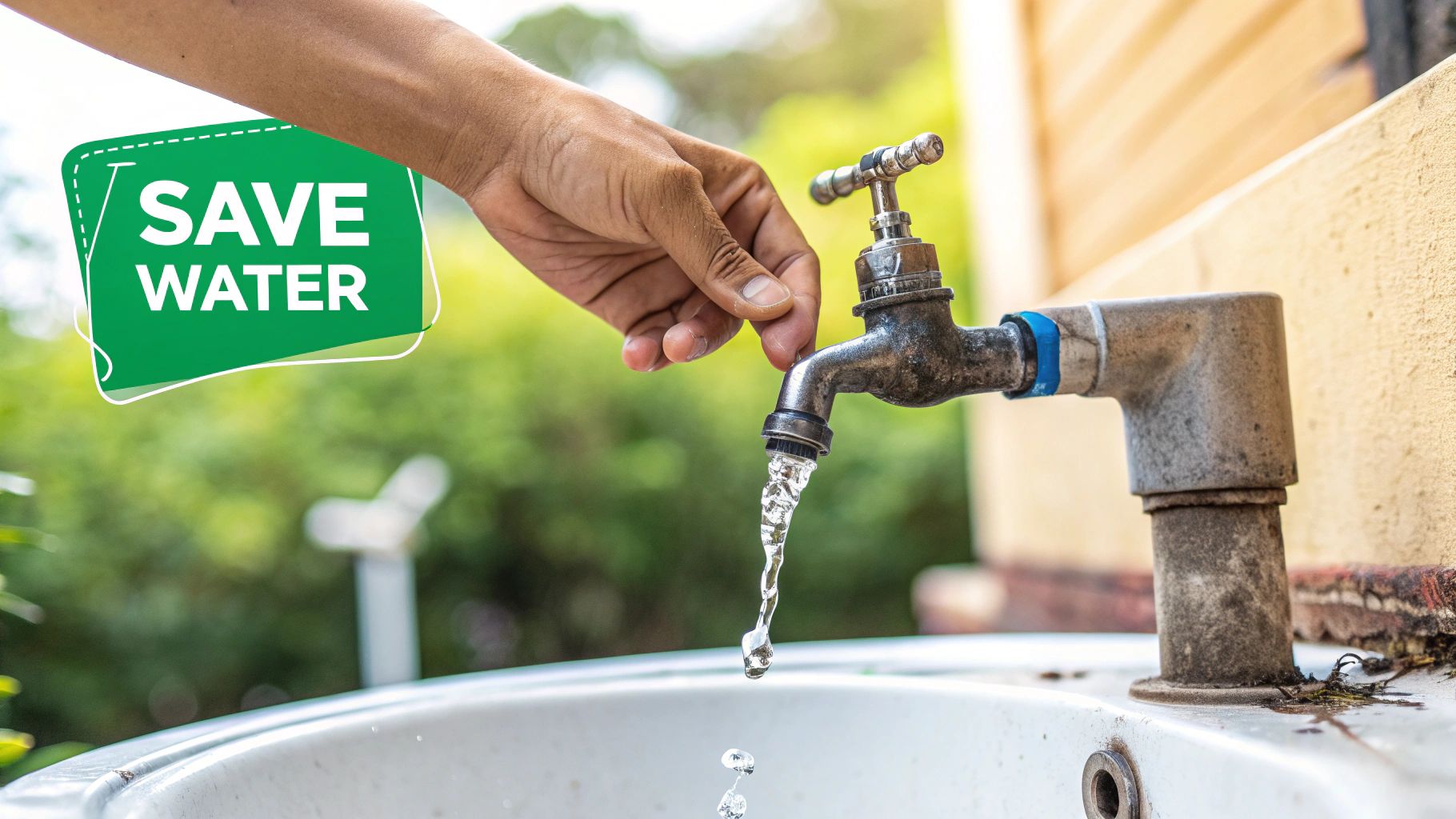
When travellers from the UK ask, "can you drink the tap water in Cyprus?", the conversation almost always turns to one thing: the taste. It's a completely subjective point, but it's often the first thing people notice and what shapes their opinion.
The water here is what you'd call "hard." That means it's packed with minerals, which is a natural side-effect of the desalination process used to make seawater drinkable. A good way to think about it is like sampling different brands of bottled mineral water. They're all safe to drink, but each one has its own distinct flavour.
This is quite a contrast for anyone used to the "soft" water common across much of the UK, which has a lower mineral content and is often treated with chlorine. So, when you taste Cypriot tap water, that difference you're noticing is simply the mineral profile.
From Source to Tap: What Shapes the Flavour?
Of course, it's not just about minerals. The local environment and the island's water infrastructure also influence what comes out of the tap. A quick look at some data helps put this into perspective.
Cyprus has a water pollution index of 40.40, which is considered moderate. For comparison, the UK’s index is lower at 30.93. This reflects different challenges and levels of infrastructure maturity between the two countries. You can dig into a detailed comparison of UK and Cyprus pollution data on Numbeo.com if you're curious.
This doesn't mean the water is unsafe; it simply highlights that the journey from source to tap is different. These environmental factors, combined with the heavy reliance on desalination, all contribute to that final, mineral-rich character.
Instead of seeing the different taste as a negative, I always encourage people to treat it as part of the local experience—just like trying regional foods and drinks. It’s a small, perfectly safe part of what makes Cyprus, Cyprus.
Alright, let's move from the theory to the practical. You know the water is safe, but how can you make staying hydrated in the Cypriot heat a genuinely pleasant and easy experience? Here are a few tried-and-tested tips from those who know the island well.
The single best trick? Chill the tap water. Pop a jug or a few bottles in the fridge when you arrive at your accommodation. The cold temperature dramatically mellows out that strong mineral flavour that can be off-putting for some visitors, making it far more palatable and refreshing.
If you're staying in a villa or an apartment, a simple water filter jug is a brilliant buy for your trip. It's a small investment that pays off with every glass.
Develop Smart Hydration Habits
A couple of small changes to your daily routine will make a massive difference, not just for your health but also for your travel budget and the local environment.
- Always Carry a Reusable Bottle: Cyprus gets seriously hot, especially mid-summer. Having a reusable bottle on hand is non-negotiable. You'll drink far more water than you expect, and this one simple habit saves you a fortune on single-use plastics.
- Invest in a Filter Bottle: If you're particularly sensitive to different tastes in water, a personal filter bottle (from brands like Brita or Lifestraw) is the perfect solution. You get crisp, clean-tasting water wherever you go, straight from the tap.
Think of it this way: opting for tap water over bottled is more than just a personal choice—it's a conscious act of sustainable travel. You'll cut down your plastic footprint and save a surprising amount of cash that's much better spent on island experiences.
And speaking of experiences, proper hydration is key whether you're lounging on Nissi Beach or exploring all the incredible things to do in Cyprus. Following these tips means you can enjoy every moment comfortably and affordably.
Your Cyprus Water Questions Answered
Let's clear up some of the most common questions travellers ask about the water in Cyprus. Here are some quick, straightforward answers to help you stay hydrated and worry-free on your trip.
Is It Safe to Have Ice in My Drinks?
Absolutely. The ice you get in restaurants, bars, and hotels is perfectly safe. It’s made from the same treated and filtered tap water that comes out of the tap. Commercial ice machines have their own purification systems too, so go ahead and enjoy that chilled drink without hesitation.
Can I Use Tap Water for Baby Formula?
This is one area where it pays to be a little more cautious. While the water is officially safe, most parents and health experts suggest using bottled water when making up baby formula. A baby’s digestive system is incredibly sensitive, and the high mineral content in Cypriot water might be a bit much for them.
For total peace of mind, it’s always best practice to boil any water you use for formula, whether it’s from the tap or a bottle.
Do Cypriots Drink the Tap Water?
You'll find it's a real mix, much like you'd see in the UK. Many locals are perfectly happy drinking tap water every day, especially if they live in newer buildings with modern pipes.
On the other hand, plenty of Cypriots simply prefer the taste of bottled water or use a filter jug at home. It’s a habit driven by personal preference, not a health concern.
It's a matter of taste rather than safety. The choice often comes down to what an individual is used to, not a concern over quality.
Is the Water Safe in North Cyprus?
It’s best to stick to bottled water in North Cyprus. Because it's not part of the EU, the water system doesn't follow the same strict regulations and the infrastructure can be quite different from the Republic of Cyprus.
To be on the safe side, we strongly recommended that you drink only bottled water while visiting the northern part of the island. It’s a simple precaution that prevents any potential tummy troubles.
What About Paphos and Other Tourist Areas?
In major tourist hubs like Paphos, Limassol, and Ayia Napa, you can feel confident about the water quality. The infrastructure in these areas is generally modern and very well-maintained to cater for the high volume of visitors.
So, whether you're out exploring the many fantastic things to do in Paphos or relaxing by the pool, the tap water is up to standard and safe to drink.





